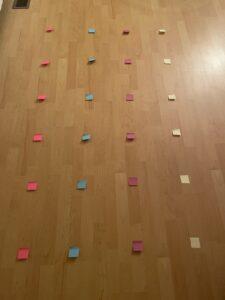The Yoga Challenge App, created by Buttershy Studios and playable on Android devices, provides family-friendly fun for both children and adults. Twist (temporary name), created by myself, Bessie, Eric, and Eugene, is a physical game aimed for people of all ages.
While both the Yoga Challenge App and Twist have similar aesthetic components and formal elements, they differ in gameplay dynamics created from the rules and regulations. Twist excels in its ability to offer players creative expression and direct team competition.
When analyzing the formal elements of the Yoga Challenge App and Twist, both have similarities in players, outcomes, boundaries, and objectives. Both are team-competition games. Twist is a team game at heart, relying on multiple teams competing to thrive. Though the Yoga Challenge App only offers a single-player and partner version, we improved it by modifying it to compare the points between the two teams to create a team competition game. Thus, Twist has built in principles of team competition and fellowship while the Yoga Challenge App had to be modified to reach the same result, but this change greatly added to the competitive nature of the game.
In terms of outcomes, both are zero-sum games. In the Yoga Challenge App, teams win points by matching the yoga pose and in Twist, each round players gain points based on how many challenge cards they complete (0-3 points per round). One of my favorite moments from play-testing Twist was when both teams were trying to complete the fun card stating “Form a letter from your bodies”. The complex positions the players were getting into and the struggle to stay upright while holding the shape was very entertaining. Nevertheless, for both games the objective is to complete the challenge and the team with the most points at the end wins.
In terms of the boundaries, both games have similar physical limitations. In the Yoga Challenge App, players have to remain on the yoga mat, while in Twist, the boundaries are the edges of the mat (or rectangle created by post-it notes in playtest). Once gameplay began, if players stepped or fell out of bounds, they would not be awarded points for that round. One flaw for Twist was that in this version, once a player stepped outside of the mat, the entire team lost points for the round which made the game end quickly. Thus, only having the boundary come into play during judging would allow players to plan and test out multiple ideas before committing to one.
Although both the Yoga Challenge App and Twist have the same core aesthetics of Fellowship, Challenge, and Competition, they are represented differently in each game. In the Yoga Challenge app, the mechanics of being awarded points only when identically copying a pose leads to fellowship as partners need to communicate and collaborate to achieve the difficult poses. Indirect competition is also created as the number of points a team is awarded is not affected by any other team, so competition comes from comparing final points. Finally, challenge is created from the physical obstacles and bending needed to complete poses.
Moving towards the mechanics of Twist, there can be multiple players per team and one judge. In each round, the requirement card must be completed, and the challenge and fun card can be completed for additional points. Once a team is ready to be judged, a 5 second countdown begins followed by the judge awarding points to each team. Because the cards do not specify exactly how players should arrange themselves but simply state the number of limbs that can be used or colors that should be touched, teams can achieve all points in a variety of different positions, making each round unique and allowing creative freedom. Competition arises from the simultaneous team play, where points are awarded by directly beating the other teams and completing cards quickly Challenge is also created from the physical difficulties of players contorting their bodies to reach different circles as well as mental challenges produced by the cards. One of the cleverest rules is the countdown before judging as it adds a fun challenge as the other teams scramble to get into position in just a few seconds. In the first round of Twist, my sisters called for judging while my cousins were still working out how to reach the requirement card. The countdown led to them running to jump into position, causing them to fall and everyone breaking into laughter. Finally, fellowship arises from team members communicating how to position their bodies, and when receiving cards that require players to get close and work together.
Overall, though both the Yoga Challenge App and Twist are similar, they differ in the dynamics and aesthetics created from their unique mechanics, resulting in creative and collaborative experiences for everyone.



